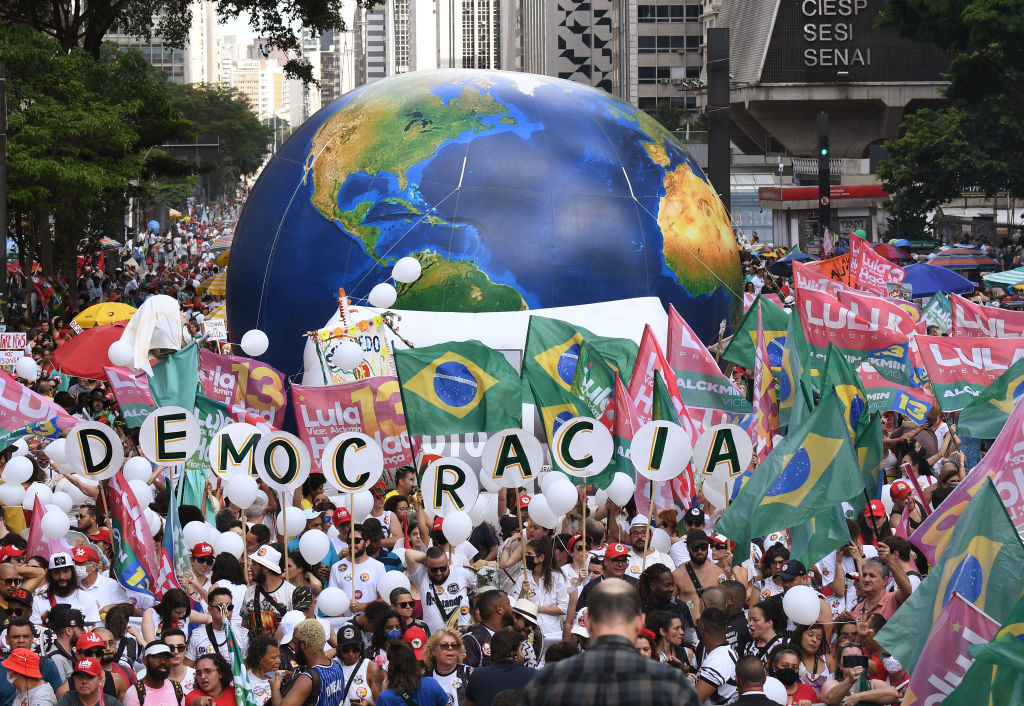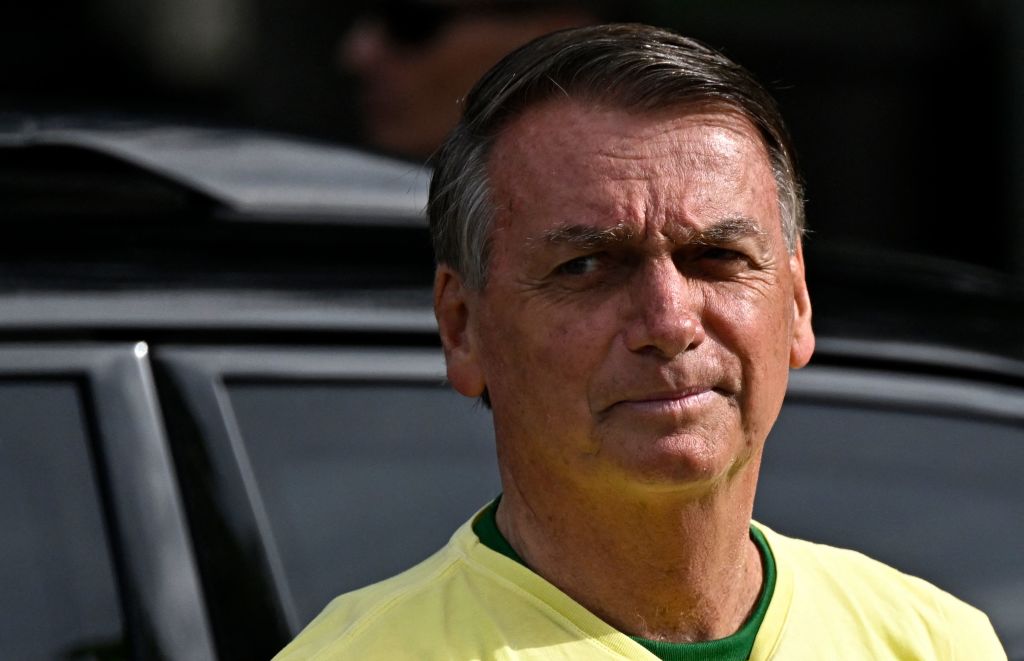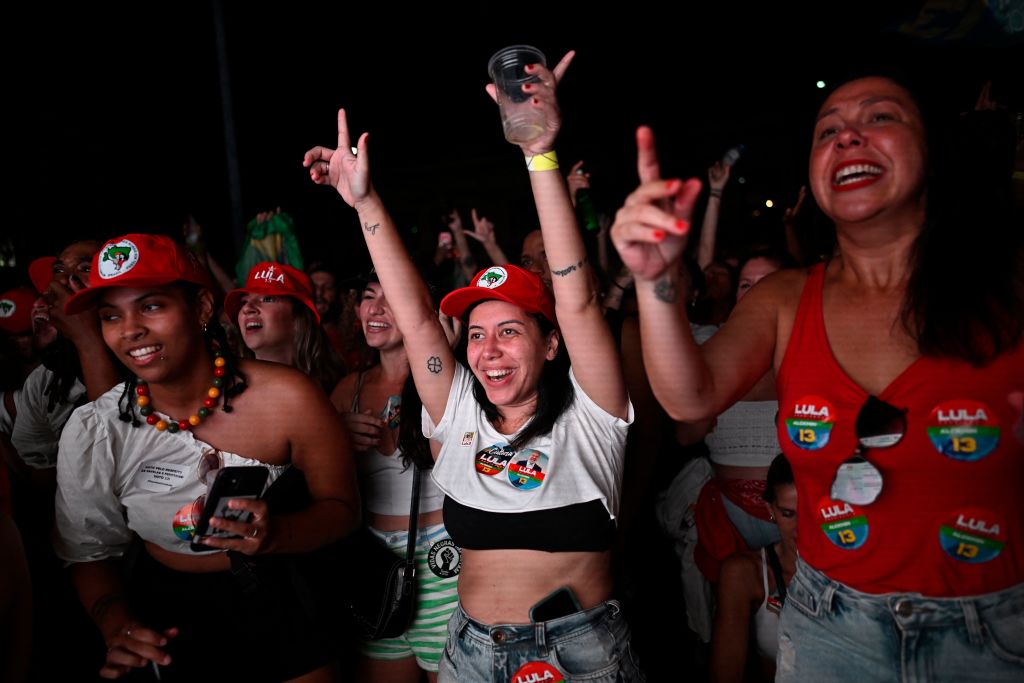It’s the comeback of the century. At national elections on Sunday, Brazilian voters delivered a narrow victory for Luiz Inácio Lula da Silva, a beloved but controversial leftist former President. The former union leader took 50.9% against 49.1% for Jair Bolsonaro, the right-wing incumbent.
The result should have marked an end to a bruising and deeply polarizing election year. Instead, it plunged the country of 200 million people into a tense two-day wait to see how Bolsonaro would respond. The President, a former army captain, had spent the past year indicating that he would not accept a loss at these elections. His campaign had repeatedly claimed, without evidence, that Brazil’s electronic voting system is vulnerable to fraud—in an echo of former U.S. President Donald Trump’s rhetoric ahead of the 2020 election.
In his victory speech on Sunday night, Lula struck a conciliatory note, aiming to heal political divisions ahead of his planned inauguration at the start of next year. “As of January 1, 2023, I will govern for 215 million Brazilians and not just for those who voted for me,” he said. “There are not two Brazils. We are one country, one people, and one great nation.”
Bolonsaro did not speak publicly for almost 48 hours after Lula’s victory was confirmed by Brazil’s election authorities. But amid the President’s silence, his supporters began to protest on his behalf, calling for a military intervention to prevent Lula from taking office. Thousands of truckers blocked more than 300 highways across 23 of Brazil’s 26 states on Monday and Tuesday. Yet Bolsonaro’s key political allies, including the speaker of the lower house of Brazil’s Congress, quickly recognized his defeat. They were joined by dozens of world leaders, including U.S. President Joe Biden and the presidents of all of Brazil’s South American neighbors, who congratulated Lula, piling pressure on Bolsonaro not to contest the result.
When the President finally called a press conference on Tuesday evening, he stopped short of conceding. But he appeared to have abandoned his hopes of remaining in office. “I will continue to fulfil all the commandments of our constitution,” he said. Later, a justice on Brazil’s Supreme Court told national media that Bolsonaro had confirmed to the court that he would not challenge the transition of power. “It is over. So, let’s look ahead,” the President reportedly said.
Read More: Lula Narrowly Wins Brazil’s High-Stakes Election, Ending Bolsonaro’s Far-Right Presidency
Who is Lula?
Lula has been a household name in Brazil for around three decades. After serving as the head of a steel-workers union in São Paulo in the 1970s, Lula helped to establish the leftist Worker’s Party, and he won his first presidential election in 2002. His two terms in office were boom times for Brazil: a surge in the value of Brazilian commodities and rising exports to China powered rapid economic growth. The windfall helped to fund a major expansion of social programs, including Bolsa Família—which provided direct cash transfers to low-income families in exchange for ensuring children’s attendance in school—cementing Lula’s popularity with poorer Brazilians. He left office in 2010 with an 83% approval rating.
Lula’s reputation later took a severe hit, though. In 2017, federal prosecutors implicated the former President in their investigation of a vast corruption scheme that they said had taken root during his administration. Lula was sentenced to nearly 10 years in prison for accepting a luxury apartment as a bribe—a charge he has always dismissed as a politically-motivated attack. (The judge who convicted him would later go on to serve as Bolsonaro’s justice minister.) In 2021, Brazil’s Supreme Court overruled Lula’s conviction, saying his right to a fair trial had been compromised—a ruling later agreed with by the U.N.’s human rights council—clearing him to run for re-election against Bolsonaro in 2022. But Brazilians remain deeply divided over Lula’s guilt or innocence: according to a September poll, 44% of voters still believe Lula was rightfully convicted, while 40% believe his conviction was unjust.
“They tried to bury me alive,” Lula said on Twitter as he celebrated his victory. “And now I’m here to rule the country—in a very difficult situation, but I am sure that with the help of the people we will find a way out and restore peace.”

How did Lula win?
Bolsonaro’s approach to COVID-19, combined with his attacks on Brazil’s democracy, allowed the former President to command a broad unity coalition against him, including his former political rivals. Geraldo Alckmin, a center-right former São Paulo Governor who was Lula’s rival in the 2006 election, will be his Vice President.
Lula pledged to “rebuild Brazil”—that is, restore public services battered by years of underinvestment, use Brazil’s fossil fuel resources to lower domestic energy prices and battle inflation, and help the millions of Brazilians struggling with food insecurity.
Read More: Brazilian Women May Cost Bolsonaro the Election
Critics say Lula’s campaign relied largely on nostalgia and that the former President has refused to share details of the economic plan that will underpin his vision for Brazil. “I am the only candidate with whom people should not be concerned about [economic policy],” he told TIME in March 2022. “Because I’ve been a President twice already. We don’t discuss economic policies before winning the elections. First, you have to win the elections.”
Lula’s next government will face a much more challenging economic landscape than his first one did in the early 2000s. Brazil has been staggering from one economic crisis to the next for eight years. Now, global economic turmoil from the war in Ukraine is driving up energy prices, while a years-long drought is curbing production in the crucial agricultural sector.

Bye bye, Bolsonaro
Bolsonaro has had a transformative impact on Brazil since his election in 2018. The President has burned bridges with many of Brazil’s foreign allies: he clashed with E.U. leaders, for example, over his refusal to protect the Amazon rainforest. Bolsonaro scrapped enforcement of laws designed to protect the forest and Indigenous peoples, and he ended projects involving international cooperation. The resulting surge in deforestation rates—a 60% increase in the first three years of Bolsonaro’s presidency—has been a major blow to global efforts to keep carbon dioxide out of the atmosphere to fight climate change.
Read More: The Fate of the Amazon Rainforest Depends on the Brazil Election
In Brazil, the President may be most remembered for his response to COVID-19: Bolsonaro trivialized the disease as a “little flu,” encouraged Brazilians not to follow state-level social distancing rules, rejected vaccine manufacturers’ early offers to supply the country, and claimed, against scientific evidence, that the shots were unsafe. Bolsonaro’s critics say he is to blame for Brazil’s staggering pandemic death toll. To date, there have been almost 700,000 recorded COVID-19 deaths in Brazil, even higher than the U.S.’ toll on a per capita basis.
Though Bolsonaro lost the presidency on Sunday, his political movement is far from dead. Many candidates who served as ministers in his government, including his controversial former environment minister, won seats in Brazil’s Congress at the first round of elections on Oct. 2, making his right-wing Liberal Party the largest party in both the upper and lower house. The governorships of Brazil’s three most economically-important states were also won by Bolsonaro allies. That could hobble parts of Lula’s agenda, particularly on long-held goals like raising the minimum wage, or scaling up Brazil’s climate targets.

Lula’s return to a world in crisis
Many world leaders will welcome Lula’s return. During his first term, Lula played an influential role in global politics, often serving as a broker between Western governments and their rivals. That may prove helpful in an era where diplomatic efforts to establish international cooperation on the climate crisis are increasingly urgent. The President-elect has vowed to bring deforestation in the Brazilian Amazon under control, which would do much to heal Brazil’s frayed relationship with the E.U.
But Lula may not be a straightforward ally for Western leaders when it comes to the major foreign policy challenge of the day: the war in Ukraine. In an interview with TIME in March, the leftist leader criticized both U.S. President Joe Biden and Ukraine’s Volodymyr Zelensky for failing to negotiate with Russia’s Vladimir Putin before war broke out.
Read More: Lula Talks to TIME About Ukraine, Bolsonaro, and Brazil’s Fragile Democracy
“The United States has a lot of political clout. And Biden could have avoided [the war], not incited it,” he said. “He could have participated more. Biden could have taken a plane to Moscow to talk to Putin. This is the kind of attitude you expect from a leader.”
Lula also told TIME that the international community’s celebration of Zelensky since the war began has been a mistake, calling for a greater focus on behind-the-scenes negotiations. “You are encouraging this guy, and then he thinks he is the cherry on your cake. We should be having a serious conversation. OK, you were a nice comedian. But let us not make war for you to show up on TV.”
This is a developing story and was most recently updated on Nov. 2, after Bolsonaro made his first public remarks since Sunday’s vote.
More Must-Reads from TIME
- Donald Trump Is TIME's 2024 Person of the Year
- Why We Chose Trump as Person of the Year
- Is Intermittent Fasting Good or Bad for You?
- The 100 Must-Read Books of 2024
- The 20 Best Christmas TV Episodes
- Column: If Optimism Feels Ridiculous Now, Try Hope
- The Future of Climate Action Is Trade Policy
- Merle Bombardieri Is Helping People Make the Baby Decision
Write to Ciara Nugent at ciara.nugent@time.com